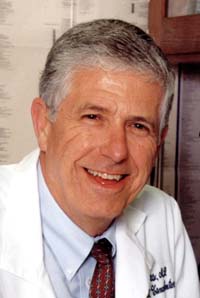
Harold Moses, M.D.
VICC to have strong voice in national cancer policies
The Vanderbilt-Ingram Cancer Center is playing a leading role in a new initiative launched May 1 by the Institute of Medicine to identify, assess and make recommendations on emerging national policy issues related to cancer.
Harold Moses, M.D., director emeritus of the Vanderbilt-Ingram Cancer Center, has been named chair of the new National Cancer Policy Forum. In addition, the 20 Forum members include Lynn Matrisian, Ph.D., chair of Cancer Biology, and Thomas Burish, Ph.D., chair of the American Cancer Society and a member of Vanderbilt-Ingram's Board of Overseers. Vanderbilt-Ingram is the only cancer center with more than one participant in the Forum.
The Forum will provide a focus within the National Academies of Science on issues in science, clinical medicine, public health and policy that are important to preventing and curing cancer, or mitigating its symptoms and effects.
Specific projects have not yet been decided, Moses said, noting that the Forum will have its first formal meeting in June. However, issues likely to be addressed include the economic impact of cancer and quality of care.
The Forum also includes representation from Dana-Farber Cancer Institute, the Centers for Disease Control and Prevention, the National Cancer Institute, C-Change (formerly the National Dialogue on Cancer), City of Hope, Merck, the American Society of Clinical Oncology, the Agency for Healthcare Research and Quality, UnitedHealth Group, Amgen Mayo Clinic, Fred Hutchinson Cancer Research Center, the Office of Minority Health and Health Disparities, UCLA, MD Anderson Cancer Center, the National Coalition for Cancer Survivorship, the Centers for Medicare and Medicaid Services and the Food and Drug Administration.
The Forum replaces another organization, the National Cancer Policy Board, which began in 1996 and included a more restrictive membership. The new structure will allow for more active collaboration among a broader range of groups.
The Institute of Medicine is a part of the National Academies of Science, a private organization created by the federal government to be an independent adviser on scientific and technological matters.













